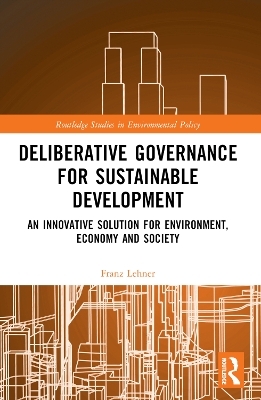
Deliberative Governance for Sustainable Development
An Innovative Solution for Environment, Economy and Society
Seiten
2024
Routledge (Verlag)
978-1-032-19867-5 (ISBN)
Routledge (Verlag)
978-1-032-19867-5 (ISBN)
Deliberative Governance for Sustainable Development argues that governance has become the core problem of sustainable development and identifies deliberative democracy and governance as a path forward for Western societies.
In this book the author puts forward three messages. Firstly, while sustainable development theoretically is a common good of all people, it is in practice constantly associated with a multitude of smaller and larger conflicts. These conflicts arise repeatedly because, in practice, the benefits, costs and risks of sustainable development are unequally distributed and therefore form a massive barrier to sustainable development. As a result, sustainable development depends on the ability of the social and political institutions of societies to accommodate these conflicts. Second, within the framework of their established institutional structures, Western societies do not have the sufficient tools for conflict resolution that are adequate to the conditions of modern diversified societies and the complex challenges of sustainable development. They need to implement institutional reforms that switch institutional structures towards deliberation. Third, by switching to deliberation, Western societies can reach the high level of governance that enables them to achieve environmentally sustainable development that will bring them significant economic and social benefits and, as a result, may reach far beyond their borders.
This volume offers a novel, transdisciplinary approach to sustainable development and governance in Western societies. It will be of great interest to students and scholars of sociology, economics, politics, environmental studies and philosophy, as well as professionals and policymakers working in the area of sustainable development.
In this book the author puts forward three messages. Firstly, while sustainable development theoretically is a common good of all people, it is in practice constantly associated with a multitude of smaller and larger conflicts. These conflicts arise repeatedly because, in practice, the benefits, costs and risks of sustainable development are unequally distributed and therefore form a massive barrier to sustainable development. As a result, sustainable development depends on the ability of the social and political institutions of societies to accommodate these conflicts. Second, within the framework of their established institutional structures, Western societies do not have the sufficient tools for conflict resolution that are adequate to the conditions of modern diversified societies and the complex challenges of sustainable development. They need to implement institutional reforms that switch institutional structures towards deliberation. Third, by switching to deliberation, Western societies can reach the high level of governance that enables them to achieve environmentally sustainable development that will bring them significant economic and social benefits and, as a result, may reach far beyond their borders.
This volume offers a novel, transdisciplinary approach to sustainable development and governance in Western societies. It will be of great interest to students and scholars of sociology, economics, politics, environmental studies and philosophy, as well as professionals and policymakers working in the area of sustainable development.
Franz Lehner is Professor Emeritus of political science and of applied social research at the Ruhr-University of Bochum, Germany. For more than 20 years he was President of the Institute of Work and Technology, Gelsenkirchen, Germany, a public institute for applied research on economic and social change.
1. Sustainable Development: The Real Challenge 2. Sustainability: A Threefold Challenge 3. The Economic Charm of Ecology 4. From the Wealth of Nations to the Wealth of People 5. A Social Contract for a Sustainable Society 6. Mastering the Knowledge Society 7. The Deliberative Switch
| Erscheinungsdatum | 05.09.2022 |
|---|---|
| Reihe/Serie | Routledge Studies in Environmental Policy |
| Verlagsort | London |
| Sprache | englisch |
| Maße | 156 x 234 mm |
| Gewicht | 408 g |
| Themenwelt | Naturwissenschaften ► Biologie ► Ökologie / Naturschutz |
| Technik ► Elektrotechnik / Energietechnik | |
| Wirtschaft ► Volkswirtschaftslehre | |
| ISBN-10 | 1-032-19867-2 / 1032198672 |
| ISBN-13 | 978-1-032-19867-5 / 9781032198675 |
| Zustand | Neuware |
| Haben Sie eine Frage zum Produkt? |
Mehr entdecken
aus dem Bereich
aus dem Bereich


